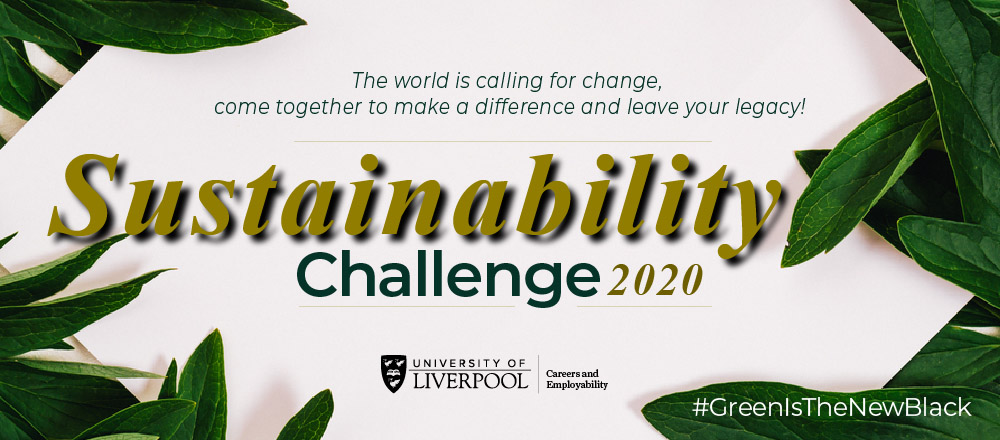How University of Liverpool Students are tackling sustainability
Posted on: 11 June 2020 in Graduate stories

Sustainability and our planet is a priority for us all; together we should consider how we will adapt our everyday activities, as well as consider how we will ensure discussion on this topic continues to be at the forefront of everything we do.
Questions constantly on our minds should focus on all things sustainable:
- Are you switching off lights when not in use?
- Can you recycle more plastic?
- Do you throw away food waste?
The problem however is not the individual, but rather the volume of people now on our planet. The world’s population is growing and sustainability is struggling to keep up; more people means more chance of harm to our beautiful planet with the mindset that currently exists. Example setting is the only way people will follow suit and here at the University of Liverpool green is definitely the new black, as our students make a positive sustainable change both socially and environmentally.
The Ideas
The springboard for change came through the Sustainability Challenge 2020, offering students the opportunity to express their ideas on how the university can be more sustainable. The topic seemed to resonate with our student body and all of the entries we received aligned to at least one of the UN Sustainability Goals. Ideas from the cohort of finalists focused on all things sustainable.
Poppy Cooke a third-year Psychology student focused on food consumption. She looked at reducing the availability of red meat on campus and the inclusion of environmental information on menus and signs. Furthermore, there was a call for meat-free days (for example meat-free Mondays.)
Charles Berry a third-year Chemistry student looked at the idea of reducing plastic wastage in university labs by using recyclable packaging for lab equipment, washing and reusing of equipment along with more efficient disposal.
Simon Schaeffer and Anirudh Parengal, both first years studying Business Analytics and Big Data and International Business, came up with the idea entitled "The Green Bill Challenge". Here green bill meters would be installed into University accommodation flats enabling reduced energy consumption to be recorded, and incentive prizes given out for the highest savers.
The sustainability insights students highlighted were both thought-provoking and inspirational introducing diverse and interesting topics we can practically tackle as an institution. The Guild of Students has offered its support to help grow all of the ideas so watch this space!
The Winner
There could only be one winner and this was Nathaniel Jenkins a 1st Year Business Management student whose idea was to deliver University-led cookery classes to provide students with skills and knowledge in home cooking. This model targets important sustainable areas such as good health and well-being, along with responsible consumption and production. Careers and Employability will now work with Nathaniel to promote his idea throughout the academic term.

“The sustainability challenge has been a really fun and thought-provoking experience for me. The requirements for creativity, research, and pitch delivery has resulted in an improvement in these skills” - Nathaniel Jenkins comments on the challenge (Pictured)
Changing our future
There is no better time to be sustainable. The world we are living in is rapidly changing and we can all work together to help influence how it evolves. The example set by these students will hopefully create a domino effect at the University which will spread beyond into our communities to ensure that we make a difference.
A famous quote "one small step for man, one giant leap for mankind" encapsulates this approach, highlighting that the little changes amongst a worldwide community make all the difference. Here at the University of Liverpool we have made great strides towards this positive change and we look forward to seeing these ideas being implemented across our institution. Change and evolution take time but it will always be for the better-remember slow and steady wins the race!
#GreenIsTheNewBlack
Keywords: Case studies .